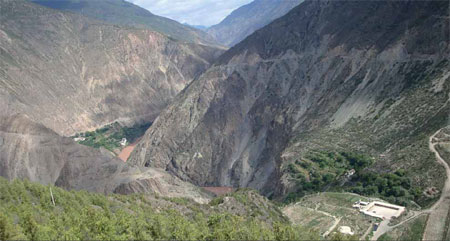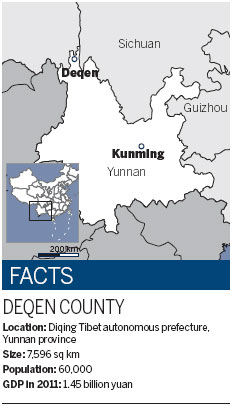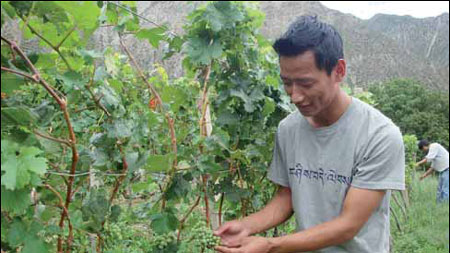High ambitions
Updated: 2012-08-31 10:44
By Xiao Xiangyi and Li Yingqing (China Daily)
|
|||||||||||

|
Top: Vineyards in a river valley in Bu village, in Southwest China's Yunnan province. Above: A Tibetan grape expert checks the growth in a vineyard in Deqen county, Yunnan province. Photos by Xiao Xiangyi / China Daily |
A European drinks maker is pinning its hopes on wine produced in a mountainous area of China
From dawn to dusk Litsing-Gerong shuttles between vineyards in several villages issuing instructions to farmers on how to deal with ill-formed or sickly grapes. When he finally pulls up for a rest, after hours of negotiating muddy, winding roads in his SUV, a reward awaits him: the fragrant bouquet and taste of red wine that will help lift some of the burden from his tired bones.
 |
For Litsing-Gerong, 47, a Tibetan grape expert in Deqen county, in Southwest China's Yunnan province, this typical day in August is a critical time when grape ripening begins.
Litsing-Gerong is credited with being the person who introduced the grape industry to the county, which lies at the foot of Meli Mountain, an altar of pilgrimage for Tibetans.
Little more than 10 years ago the grape growing qualities of the region, its terroir, were yet to be discovered, let alone harnessed, and few could have imagined how things would change.
The region is far beyond the edge of what is regarded as the golden belt for northern hemisphere vineyards, between the latitudes of 35 degrees north and 45 degrees north, so any suggestion that it would one day become a magnet for wine producers would no doubt have seemed preposterous then.
Adding to the nagging feeling that these vineyards seem to be in the wrong place is the fact that they are at altitudes of up to 2,800 meters above sea level, equivalent to being on the top half of Mont Blanc, the highest mountain in Western Europe.
Even today, most of the locals of Deqen, 82 percent of whom are Tibetan, have probably not realized that their vineyards are redrawing the global wine production map.
"But they do have a feeling that all their cornfields will soon turn into vineyards," Litsing-Gerong says.
One of those responsible for this mini agrarian revolution is the French wine and spirits maker Moet Hennessy, which agreed in February to partner with Vats Group Ltd, a Chinese liquor maker, to produce premium red wine in Deqen county. Moet Hennessy has a 66.7 percent share in the project and Vats has the rest.
The venture, Moet Hennessy Shangri-La (Deqen) Winery Co Ltd, will set up a 30-hectare vineyard at Adong village in Deqen county in the first phase, from 2012 to 2019.
When the venture was announced, Mark Bedingham, managing director of Moet Hennessy Asia Pacific, was quoted as saying the wine produced in Deqen would first be distributed mainly in China and probably elsewhere later.
Since the wine will be matured in barrels and chateaus for two years before going on the market, it will not be for sale for three or four years.
| ||||
Wine is not the only beverage tickling the palates of companies with designs on this area of China. Yunnan province has become a battlefield for international coffee giants including Nestle and Starbucks as they seek to gain access to the country's prime coffee bean plantations.
As with the coffee industry, Yunnan, especially the area around picturesque Meli Mountain, is set to become an ideal destination for wine producers and investors despite its relative isolation.
"Moet Hennessy's investment looks like becoming a pebble dropped into a pool, with a widening circle of ripples," Litsing-Gerong says.
On June 30 Beijing Ufida Software, one of China's largest software companies, signed a contract with the Deqen government for investment in a 20-hectare vineyard at Benzilan village to produce 100 percent organic grapes.
The Hong Kong-based conglomerate Goldin Financial Holdings Ltd, which bought a 16-hectare winery in California last year, is also looking at investing in the Deqen vineyards, Listsing Gerong says. Goldin Financial Holdings could not be reached for comment.
While Moet Hennessy's presence in the Deqen project is helping open up the region to the world, it is not as though the French company is the first to pop a cork there. Yunnan Red Winery, the largest winery in southwestern China, set up vineyards there as early as 10 years ago, Vats Group began to buy grape varietals ranging from cabernet sauvignon and chardonnay to merlot from farmers in Adong village five years later, and Sunspirit Wines started a collection of rieslings and cabernet sauvignon in Bu village two years ago to produce ice wine.
Indeed, if you turn back the clock 150 years or so you will find a French missionary traveling to Yunnan via the famous Ancient Tea Horse Route. At Cizhong village in Deqen in 1860 the missionary built a church and planted vines with seeds brought from France.
Yunnan can also boast of being the world's sole repository of a rare grape varietal called rose honey, which has been extinct in France for more than 100 years.
By the end of last year Deqen had vineyards covering 600 hectares, and that is forecast to increase to 714 hectares by the end of this year.
"Land is still limited, so we are focusing on pursuing quality rather than quantity," Litsing-Gerong says.
Sunspirit Wines invested 30.1 million yuan ($4.74 million, 3.77 million euros) to set up its ice-wine chateau in Bu village with vineyards covering 30 hectares in 2007. Each year production at the chateau is limited to 110 metric tons of wine, selling at more than 1,500 yuan a bottle, usually in upmarket clubs.
"We're unlikely to expand our vineyards there," says Jia Bin, general manager of the Sunspirit chateau. "Scarcity and high quality help decide the premium direction; we only make premium wines."
Another person who can see how compelling such facts and figures are is Xiao Wu, a farmer in Adong, who has abandoned growing corn and mushrooms in favor of grapes.
The main source of the Xiao family's income is its 0.2-hectare vineyard. Xiao spends just three hours in the vineyards every day, and he says Vats pays 90,000 yuan a year for a hectare of grapes.
"That's three times what we used to get for corn. Without this vineyard I could never have afforded to send my son to college."
However, as attractive as that all sounds, the uncertainties and difficulties in growing any crop never seem to disappear. Xiao says that while he expects another good harvest this autumn, he has been in frequent touch with local bioresource office as he has battled with red spider mites, a common vineyard pest. "These pests and diseases need to be nipped in the bud," Xiao says.
Cui Kexu, technical director of Vats Group, says Moet Hennessy Shangri-La (Deqen) Winery will change the relationship between companies and local farmers. "Instead of buying grapes from farmers, the venture will first rent farmers' land at a contract price and farmers will be able to choose to become contract workers of the company. The venture's technicians, rather than the farmers, will manage the vineyards."
Tsongsangnyang, head of Adong village, says most grape farmers in area are happy with the French company's arrival.
"As long as the rent and salaries are reasonable, farmers will love to take the risk-free choice because they will never worry about production. They can draw a stable income from leasing, salaries and perhaps selling manure.
"The pity is that with all the land being turned into vineyards, good-quality grain will never be produced here."
Xiao's family is one of the 138 grape farmer households at Adong taking part in the venture. They started to plant vines in 2003 and produced the first grapes in 2006, a lead time that produced hardships.
"Because farmers were not producing anything they had no income," Litsing-Gerong says. "The government and the company had a lot of faith and determination, but it was hard trying to persuade our farmers to go through this painful transition."
Local government distributed free seeds, poles and wire to the farmers for vine plantations and gave subsidies of 4,500 yuan a hectare a year over those lost three years.
There was also skepticism among locals and non-locals alike about the viability of the project.
"For many wine lovers who have never been here and tasted the wine, it would be hard to imagine that premium wine can be produced at such a latitude and altitude," Litsing-Gerong says. "Earlier, 80 percent of local government officials were just as skeptical. But wine experts invited here to study the climate, soil and cultivation concluded that this is indeed an incredible land."
Cui of Vats says that the area's geography is more than just a selling point. "It also endows the wine with exceptional quality."
Grapes such as cabernet sauvignon produced in the area are high in sugar, acidity and tannin, says Zhang Zhenwen, deputy dean of the College of Enology at Northwest Agriculture and Forestry University in Shaanxi province.
"Vineyards in Deqen are located in the dry-hot river valley in the plateau, so the abundant heat, sunlight and the big temperature difference between day and night help sugar to accumulate. Less rainfall compared with other wine-producing regions reduces pests and diseases. The long growing season gives the grapes on the plateau a high degree of ripeness.
"It's also nice to know that with these vineyards a kind of ecological agriculture has sprung up. The local Tibetans usually keep livestock as well as planting vines, and the manure will be the best, free organic fertilizer for the vineyards."
Cui says his company's confidence is also based on the region's relatively stable production volume. "Even in drought years, melted snow water is always channeled from Meli Mountain for irrigation."
Asked whether the venture is keen for the extraordinary vineyards to be exclusive, Cui says that, on the contrary, it would love to see more good wine producers go to the region. "The Chinese wine market is increasing dramatically, beyond comprehension. Reputed wine producers will help shape the young wine-producing region. But only good ones ought to come, because land is limited."
Cui says that while the mountainous terrain presents difficulties for transport, a road is being built. Still, the region is unique for the very reason that it is remote and clean, he says.
Litsing-Gerong says one problem is a shortage of enologists, particularly ones who are bilingual, and that is a problem the local bioresource office needs to tackle. "They need to be able to use Mandarin to talk to experts and translate the information into Tibetan for the farmers."
Contact the writers at xiaoxiangyi@chinadaily.com.cn and liyingqing@chinadaily.com.cn
(China Daily 08/31/2012 page16)
Today's Top News
Rescuers race against time for quake victims
Telecom workers restore links
Coal mine blast kills 18 in Jilin
Intl scholarship puts China on the map
More bird flu patients discharged
Gold loses sheen, but still a safe bet
US 'turns blind eye to human rights'
Telecom workers restore links
Hot Topics
Lunar probe , China growth forecasts, Emission rules get tougher, China seen through 'colored lens', International board,
Editor's Picks

|

|

|

|

|

|








